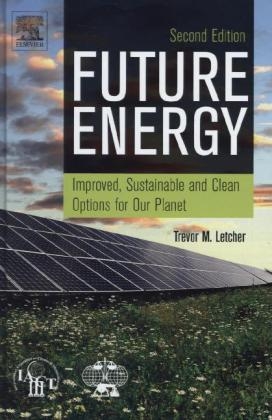
Future Energy
Elsevier Science Ltd (Verlag)
978-0-08-099424-6 (ISBN)
- Titel erscheint in neuer Auflage
- Artikel merken
As the demand for global energy increases, fact-based evaluations of alternative energy sources are needed in order to address the growing interest in how energy is produced, provided, and transported in sustainable ways. Future Energy, Second Edition provides scientists and decision makers with the knowledge they need to understand the relative importance and magnitude of various energy production methods in order to make the energy decisions needed for sustaining development and dealing with climate change. The second edition of Future Energy looks at the present energy situation and extrapolates to future scenarios related to global warming and the increase of carbon dioxide and other greenhouse gases in the atmosphere. This thoroughly revised and updated edition contains over 30 chapters on all aspects of future energy, each chapter updated and expanded by expert scientists and engineers in their respective fields providing an unbiased and balanced view of the future of energy.
Professor Trevor Letcher is an Emeritus Professor at the University of KwaZulu-Natal, South Africa, and living in the United Kingdom. He was previously Professor of Chemistry, and Head of Department, at the University of the Witwatersrand, Rhodes University, and Natal, in South Africa (1969-2004). He has published over 300 papers on areas such as chemical thermodynamic and waste from landfill in peer reviewed journals, and 100 papers in popular science and education journals. Prof. Letcher has edited and/or written 32 major books, of which 22 were published by Elsevier, on topics ranging from future energy, climate change, storing energy, waste, tyre waste and recycling, wind energy, solar energy, managing global warming, plastic waste, renewable energy, and environmental disasters. He has been awarded gold medals by the South African Institute of Chemistry and the South African Association for the Advancement of Science, and the Journal of Chemical Thermodynamics honoured him with a Festschrift in 2018. He is a life member of both the Royal Society of Chemistry (London) and the South African Institute of Chemistry. He is on the editorial board of the Journal of Chemical Thermodynamics, and is a Director of the Board of the International Association of Chemical Thermodynamics since 2002.
Chapter 1 Introduction with a Focus on Atmospheric Carbon Dioxide and Climate Change
Chapter 2 Conventional Oil and Gas
Chapter 3 Coal Extraction and use in Power Generation
Chapter 4 Frontier Oil and Gas: Deepwater, Arctic
Chapter 5 Unconventional Oil and Gas: Oilsands
Chapter 6 Unconventional Oil and Gas: Oil Shales and Fracking
Chapter 7 Coal-bed Methane
Chapter 8 Methane Hydrates
Chapter 9 Nuclear Fission and the new Thorium process
Chapter 10 Nuclear Fusion
Chapter 11 Transport Fuel: Ethanol and Biofuels
Chapter 12 Transport Fuel: Biomass-, Coal-, Gas- and Waste-to-Liquids Processes
Chapter 13 Transport Fuel: LNG and Methane
Chapter 14 Transport Energy – Batteries
Chapter 15 Wind Energy
Chapter 16 Tidal Energy
Chapter 17 Wave Energy
Chapter 18 Solar Energy – Photovoltaics
Chapter 19 Solar Energy – Concentrated Solar Thermal Power
Chapter 20 Solar Energy – Water Heating
Chapter 21 Hydro-Electric Power
Chapter 22 Geothermal Energy
Chapter 23 Hydrogen: An Energy Carrier
Chapter 24 Fuel Cells: Energy Conversion Technology
Chapter 25 Environmental Impacts of Energy Production, Distribution and Transport
Chapter 26 CO2 Capture and Sequestration (CCS)
Chapter 27 Energy Storage (Hydrogen storage, pumping water, phase changes, etc.)
Chapter 28 Energy Efficiency, Conservation, Energy Saving Devices, and the Smart Grid
Chapter 29 Energy Resources in Developing Nations
Chapter 30 The Transition to Future Energy
Chapter 31 Energy Options and Predictions for China
| Erscheint lt. Verlag | 18.12.2013 |
|---|---|
| Verlagsort | Oxford |
| Sprache | englisch |
| Maße | 152 x 229 mm |
| Gewicht | 1350 g |
| Themenwelt | Naturwissenschaften ► Biologie ► Ökologie / Naturschutz |
| ISBN-10 | 0-08-099424-5 / 0080994245 |
| ISBN-13 | 978-0-08-099424-6 / 9780080994246 |
| Zustand | Neuware |
| Haben Sie eine Frage zum Produkt? |
aus dem Bereich



